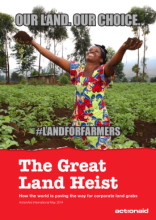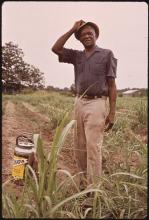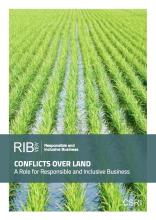Land Library Search
Through our robust search engine, you can search for any item of the over 73,000 highly curated resources in the Land Library.
If you would like to find an overview of what is possible, feel free to peruse the Search Guide.
/ library resources
Showing items 1 through 9 of 144."For millions of people living in the world’s poorest countries, access to land is a matter not of wealth, but of survival, identity and belonging.
In line with the conventional view that customary land rights impede agricultural development, the traditional tenure system in Nigeria has been perceived to obstruct the achievement of efficient development and agricultural transformation.
Food First Backgrounder, Spring 2014, Vol. 20, No. 1
Introduction: Land, Race and the Agrarian Crisis
This briefing paper makes the case for proactive business engagement in respecting land rights and ensuring legal, fair and inclusive practices on land use, access to natural resources and equitable development opportunities.
This guide provides tools to understand the Voluntary Guidelines on the responsible Governance of Tenure, which sometimes uses technical language that is not easy to understand for those who are not used to reading this kind of text.
The “Voluntary Guidelines on Responsible Governance of Tenure of Land, Fisheries, and Forests in the Context of National Food Security” (VGGT), endorsed by the Committee on World Food Security (CFS) in 2012, set out principles and internationally accepted standards for responsible practices and i
Guide to determine if monitoring is actually a viable activity that can be undertaken by their organisation.
La présente loi comporte trois cent vingt sept (327) articles, et est constituée sept (7) titres, notamment) De la délimitation, de la dénomination et des chefs-lieux des Collectivités territoriales décentralisées (Titre I); Des attributions des organes des Collectivités territoriales décentralis
La Política Nacional de Desarrollo es el instrumento estratégico de largo plazo, vigente hasta el 2032, que le da respaldo político institucional a la operatividad del K’atun introducido mediante el Plan Nacional de Desarrollo K’atun: nuestra Guatemala 2032, adoptado en 2014.








